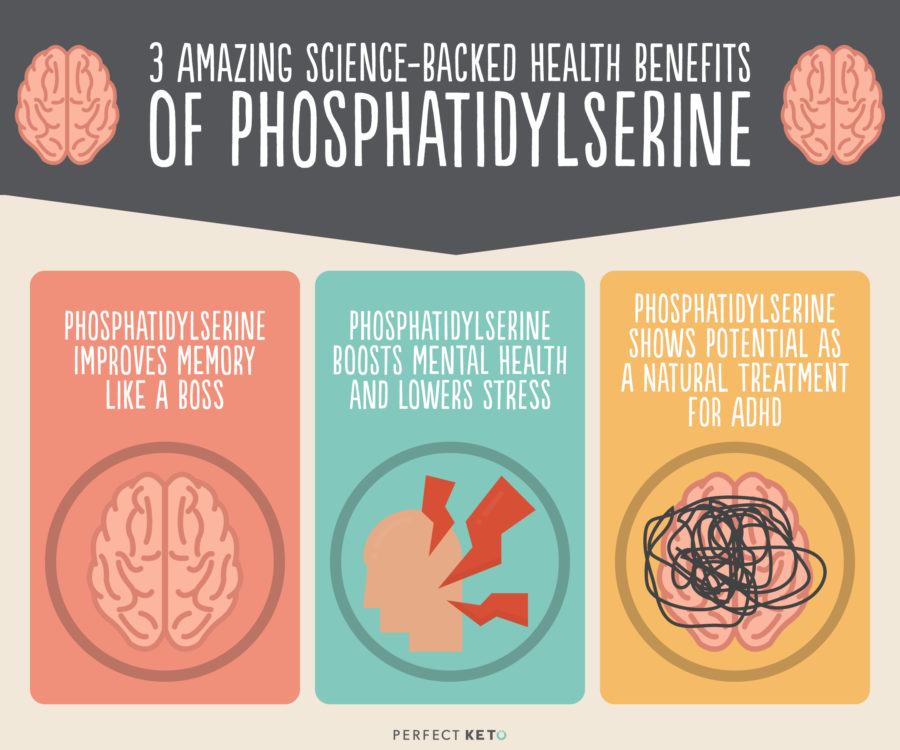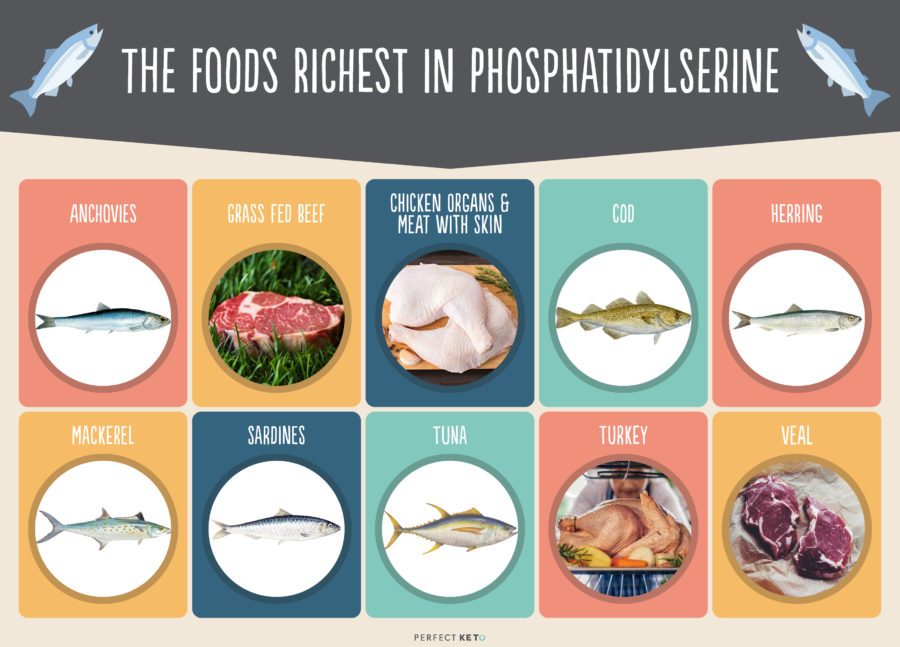First and foremost, how do you pronounce phosphatidylserine?
Great question.
Phosphatidylserine(PS) is pronounced phos·pha·ti·dyl·se(ə)r-ˌēn. If that (understandably) doesn’t clear it up for you, click here to hear Merriam Webster herself pronouncing it.
With that out of the way, here’s why you should care about this compound:
Phosphatidylserine is a phospholipid found in mammal cells — most readily in the 300 billion cells inside your brain.
It may just change your world for the better, especially if you’re looking to improve your memory and cognitive function.
In this guide, we’ll dive into why PS matters and why you need more in your diet asap:
What Is Phosphatidylserine and Why Does It Matter?
Phosphatidylserine (PS) is what is called a phospholipid. A phospholipid is a molecule that is a phosphorous on one end and a lipid (fatty acid) on the other end.
It’s found in many cell membranes in mammals, but most heavily concentrated in brain cells and neural tissue.
Phosphatidylserine is required for keeping healthy nerve cell membranes and myelin, which allows communication between your neurons and protects brain function.
As we get older, our bodies go through natural decline, including our brains. Scientists discovered that preserving PS levels can prevent age-related neurodegeneration.
One study published in Nutrition concluded that:
“Aging of the human brain is associated with biochemical alterations and structural deterioration that impair neurotransmission. Exogenous PS (300-800 mg/d) is absorbed efficiently in humans, crosses the blood-brain barrier, and safely slows, halts, or reverses biochemical alterations and structural deterioration in nerve cells[*].”
According to research[*], supplementing with phosphatidylserine…
- Prevents and fights deterioration in nerve cells
- Aids the formation of short-term memory and consolidation of long-term memory
- Helps create new memories and retrieve existing memories
- Boosts your ability to learn and recall information
- Improves your ability to focus attention, concentrate, reason and solve problems
- Boosts language skills and the ability to communicate
- Supports locomotor functions, especially rapid reactions and reflexes
That makes it sound like phosphatidylserine supplementation could solve all the world’s problems. Although that may not be the case, it can definitely help you if your struggle with either stress-related or age-associated memory impairment, anxiety, depression, ADHD symptoms and even insomnia.
Our Perfect Keto Nootropic contains 100 mg of phosphatidylserine per scoop, along with other powerful nootropics to boost your brain power.
All these brain perks of PS can do a lot for your overall health, so let’s take a closer look at its benefits:
3 Amazing Science-Backed Health Benefits of Phosphatidylserine

#1: Phosphatidylserine Improves Memory Like a Boss
Memory issues related to chronic stress, the natural aging process, mental health conditions and insomnia have all been shown to be improved by supplementation with PS[*][*][*].
One study found that taking 100 mg/day of a combination of PS with DHA can improve and maintain cognitive function in older people who don’t have neurodegeneration.
Turns out, DHA can boost PS synthesis in your brain and make it more effective for brain function and memory, so that’s why this blend is so effective.
While there is a substantial and growing body of research showing the potential benefits of PS for Alzheimer’s patients, it’s best to save that for researchers and health care providers[*].
That said, researchers are stacking up more and more evidence that PS does help with Alzheimer’s, so if you’re genetically predisposed, currently dealing with Alzheimer’s or know someone who is, speak with your healthcare provider. You’ll more than likely receive approval and recommendation on supplementation.
#2: Phosphatidylserine Boosts Mental Health and Lowers Stress
Memory problems and a declining mental health are closely connected.
For instance, one of the symptoms of both anxiety and depression is memory issues. Chronic and acute stress also lead to memory complications.
Fortunately, phosphatidylserine has been shown to help with both memory and mental health.
Whether you’re dealing with a depressive disorder or anxiety, PS supplementation along with counseling, a healthy lifestyle and following your health care provider’s orders can bring tremendous relief.
In a 2015 study published in Mental Illness, researchers found that PS and omega 3 fatty acids worked wonders for elderly individuals suffering from late-life depression who had been previously unresponsive to antidepressant medications[*].
This is not a permission slip to go off your medications — only do so if your doc says to and how your doc says to — but substantial evidence supports that PS can help with mental health.
Phosphatidylserine can also bring down your stress levels.
A 2014 study published in Lipids in Health and Disease found that PS normalized stress-related biomarkers (namely cortisol) in chronically stressed individuals[*].
Another 2014 double-blind study published in Advances in Therapy showed that short-term PS supplementation improved daily functioning, mental health and self-reported general well-being in older patients[*].
#3. Phosphatidylserine Shows Potential as a Natural Treatment for ADHD
If you ever want to spark a controversial conversation, shout ADHD in the middle of a PTA meeting.
There are two very different schools of thought on attention deficit hyperactivity disorder, more commonly known as ADHD.
Some say it doesn’t exist and is a byproduct of poor diet and failing schools.
Others, including scientists, say that this is a legitimate condition that impairs both children and adults’ ability to do their best in life.
Researchers have shown that phosphatidylserine supplementation in children diagnosed with ADHD is incredibly powerful, safe and has little to no side effects. In fact, the data is so strong that it’s under consideration as a natural treatment for ADHD[*][*].
A 2013 study published in The Journal of Human Nutrition and Dietetics reported that phosphatidylserine improved attention span, memory and impulse control in children with attention deficit hyperactivity disorder (ADHD) with little to no side effects[*].
Next time the ADHD controversy gets stirred up, offer up information on phosphatidylserine. Folks tend to get real quiet when 6 syllable science terms start flying.
Now that you know everything phosphatidylserine can do for your brain function, here’s how to get the best supplement:
How to Buy Phosphatidylserine
The two richest sources of PS in nature are soy lecithin and cow brains.
Because of Mad Cow Disease (bovine spongiform encephalopathy), bovine-derived PS has been mostly discontinued and replaced with plant-sourced PS (soy).
Soybean-derived phosphatidylserine is now the standard for both scientific research and for dietary supplements.
That said, soy is still a potential allergen for many and it’s very common for soybeans to be genetically modified.
That’s why it’s paramount to find a PS supplement that doesn’t contain soy traces.
The phosphatidylserine in our Keto Nootropic is soy-derived and extracted extremely carefully to make sure only this brain-boosting compound makes it into the blend, not the soy.
You can also get more PS through your diet, albeit in smaller quantities. The foods richest in phosphatidylserine include:

However, it would take several large daily servings of these foods to get the therapeutic effects we’ve discussed, so supplementation is required to reap the most benefits out of PS.
For ultimate memory function, combine your PS with omega-3 supplements or DHA.
Phosphatidylserine works even better in your brain when taken with omega 3 fatty acids, which have their own reputation for improving memory, mental health and a wide range of functions.
This effect happens because omega 3 fatty acids…
- Lend fluidity to the cell membrane, aka the protective lining of your cells. To deal with changes in pressure and pH, your cell membranes need to have fatty acids that help them “be fluid”, or bend and stretch under pressure instead of break.
- Help coat the myelin sheath. This sheath is in charge of protecting the neurons and speeding up the transmission of electrical impulses, which is critical for brain function.
Long story short, if you want to get the most out of phosphatidylserine, you’ll need to find a high-quality supplement in addition to eating the foods listed above on a frequent basis.
Phosphatidylserine Safety Concerns
Scientists are still trying to find a tolerable upper limit on phosphatidylserine supplements.
Noted side effects on doses above 300 mg a day are gas, bloating, nausea and trouble sleeping. Error on the side of caution and happy digestion by taking a supplement with less than 300 mg.
Our Perfect Keto Nootropic contains 100 mg of phosphatidylserine per scoop because we want you to get the health benefits without side effects.
PS may interact with certain medications, so give your prescribing healthcare provider a heads up, especially if you’re taking blood thinners, anti-inflammatory medications, pain meds or performance-enhancing drugs.
Remember to Get Phosphatidylserine ASAP
If you’re tired of being unable to focus, unproductive, chronically stress and missing out on your best life, consider making phosphatidylserine a part of your life.
The evidence is stack in phosphatidylserine’s favor. This phospholipid can make a dramatic difference in your memory, stress, focus, and creativity. For individuals and families affected by ADHD or Alzheimer’s, this is also a promising compound to look into.
Additionally, if you’re on the receiving end of someone’s chronic memory complaints, now would be a good time to pass this article along to them.
Start by adding more PS-rich foods to your diet and getting a high-quality PS supplement, and you’ll be on your way to thinking more clearly and feeling your best.